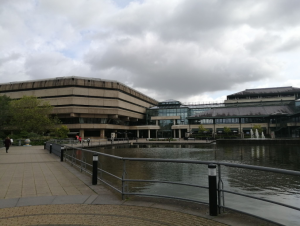
5 Archives, 2 Underground Lines and 1 PhD Student: Scott’s NWCDTP Fieldwork Trip to London
I recently returned from an NWCDTP-funded fieldwork trip conducting research at some of London’s most fascinating institutions: Royal Botanic Gardens Kew, National Archives, British Library, British Museum and Wellcome Collection. From my base in Hounslow (home to a surprising amount of watermelon vendors), I travelled to one of these archives daily for a month. While I enjoyed familiarising myself with the Piccadilly and District lines, I was not here to sample London’s public transport heritage. Instead, I was here to become privy to sources available nowhere else, to read handwritten manuscripts and printed documents relating to botany and the British Empire that were over 300 years old in some cases. My aim: to gather such sources that demonstrated biopiracy (stealing plant knowledge/material from Indigenous Peoples) occurred in the early modern period, or roughly 1600-1800, and to show the Indigenous perspective in this.

The National Archives
Did I accomplish this over a month? To my pleasure, as well as utter relief at not having totally wasted my and the NWCDTP’s time, I found material I can use in my chapters and case studies. From my fieldwork, I produced a database of over 200 individual sources, ranging from individual botanical drawings to charters and from photos of a Māori belt to accounts of Voyages to Australia. I even uncovered two potential cases of biopiracy; highly restrictive East India Company trade rights preventing Indigenous trade and a case of English ‘collecting’, or I suspect looting, after the conquest. What is particularly valuable about this fieldwork research is that the methods of biopiracy that I found, trade restrictions and looting set precedents for my research that I can continue to look for. Furthermore, because of the different leads that the sources I studied provided, I can start to uncover the Indigenous perspective of these colonial botanical encounters. Therefore this fieldwork has laid the foundation for the central thesis of my PhD and its research.
This was the first time I planned and conducted such a fieldwork trip. I had archival experience prior to this, but mostly in my hometown of Grimsby or not very far from it. As a result of planning and doing this research trip, I am now more confident in my own research and organisational abilities. Consequent to reading many early-modern manuscripts, my English palaeography skills have dramatically improved, a vital skill when doing a history PhD. I also experienced how different institutions have different atmospheres and etiquette for people who conduct research with them. I worked better at some and enjoyed my research more than others; however, the entire experience was incredibly productive, and I am very happy I completed it. I highly recommend applying to the NWCDTP Fieldwork and Conference Fund for support in conducting your PhD’s archival research.


0 Comments